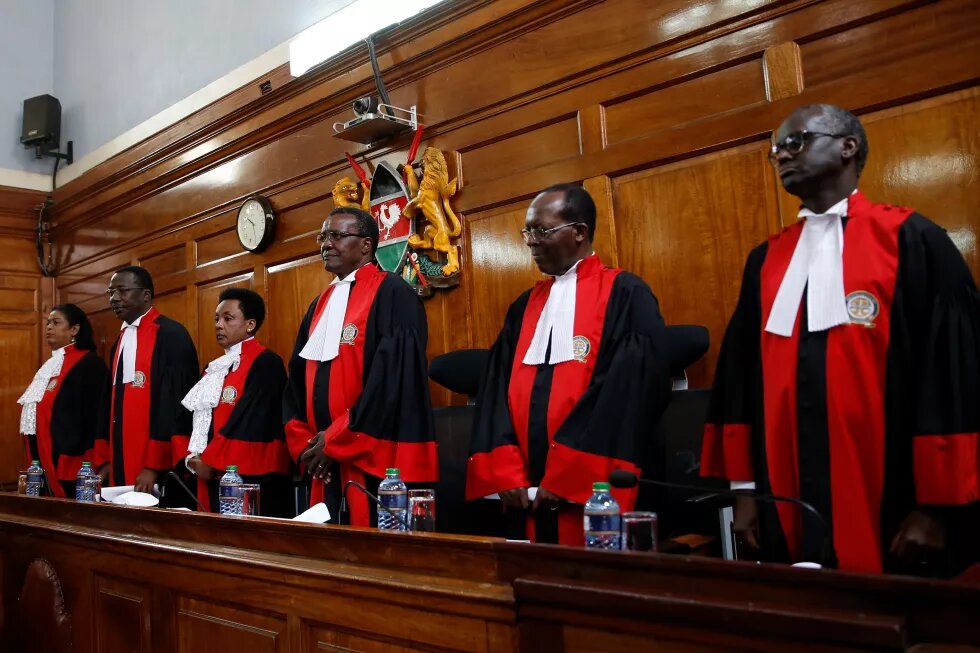
Kenyan Court Jails Men After Key 2019 Hotel Attack Verdict
Kenyan court jails men convicted of aiding the 2019 hotel attack at Nairobi’s DusitD2 complex. On Thursday, June 19, a Nairobi anti-terror court sentenced Hussein Mohammed Abdile and Mohamed Abdi Ali to 30 years in prison. Prosecutors linked them to logistics and funding support for al-Shabaab, the militant group behind the siege that killed 21 civilians, including foreign nationals.
Charges and Conviction Details
The defendants were found guilty in May, following a prolonged trial. Authorities charged them with conspiracy and facilitation of terrorism. Evidence showed they provided fake identification and financial support to two assailants who escaped a refugee camp to join the attack.
Judge Diana Mochache said:
“Without financiers, facilitators and sympathisers, terrorists cannot actualise their activities.”
Each man pleaded not guilty. However, the court accepted the testimonies of 45 prosecution witnesses, including aid workers and officials who identified how the two suspects helped design and facilitate the attack.
The January 2019 DusitD2 Hotel Attack
The 2019 hotel attack began on the afternoon of January 15, 2019. Al-Shabaab militants bombed a restaurant near the 14 Riverside Drive complex and proceeded to storm the DusitD2 hotel and nearby offices. The siege lasted over 12 hours. Kenyan police and military eventually killed all five attackers and rescued hundreds of hostages.
The attack tragically claimed the lives of 21 civilians, including a Kenyan soldier and foreign staff members. Among them were nationals from the U.S. and U.K. The coordination and timing of the assault demonstrated the sophistication of al-Shabaab’s operations .
Role of the Convicts in the Attack
Prosecutors showed how Hussein Abdile and Mohamed Ali arranged fake identity cards for the attackers. They also transferred funds to facilitate their travel and purchase of materials. The forged documents helped assailants leave a refugee camp without raising suspicion.
Further evidence revealed financial trails and witness testimony linking the two men directly to the operational support of the militants. Judge Mochache pointed out their actions formed the backbone of the terrorists’ ability to plan and execute the attack .
Sentencing and Legal Standing
On June 19, the court handed down a 30‑year custodial sentence for each convict. The men now have 14 days to file an appeal. The judge also ordered submission of probation reports before final imprisonment terms take effect.
This sentence aligns with Kenyan Anti-Terrorism laws, which impose stiff penalties for facilitation—even where suspects are not direct perpetrators. Authorities say this judgment sets a strong precedent in Kenya’s anti-terrorism campaign.
Broader Anti-Terrorism Context
This verdict comes amid intensified Kenyan efforts to curb aiding al-Shabaab networks. The group has repeatedly targeted Kenya, both as retaliation for its military presence in Somalia since 2011 and as part of wider regional terror campaigns.
Previous attacks include the 2013 Westgate Mall siege and the 2015 Garissa University massacre. The DusitD2 attack is often ranked among the most lethal and audacious strikes in Nairobi. Security experts note that while bombers and shooters are stopped, support networks remain active unless confronted legally.
Reaction from Authorities
Kenyan Interior Minister and national officials welcomed the verdict. They said it was a strong message to anyone considering abetting terrorist groups. A government spokesperson urged communities to share information and help law enforcement break down terror finance chains.
Civil society groups also praised the sentence. They said prosecuting facilitators—those who fund or aid terrorists—is critical. If only attackers face prosecution, support systems remain intact and operational.
Challenges and Next Steps
Despite the victory, authorities note that dismantling al-Shabaab’s support network remains hard. Fake IDs can still be sourced, funds still transferred electronically, and recruitment persists in vulnerable communities.
Officials now expect more cases targeting those behind the scenes. A senior counterterror analyst, speaking anonymously, stressed: “We must follow the money, the documents, and those who provide them. That is how you cut off terror at its roots.”
Victims and Community Impacts
Families of those killed in the 2019 attack expressed relief at the convictions. They said machinery of terror often prevails because supporters go unpunished.
A victim’s relative, who requested anonymity, stated: “We haven’t forgotten the pain. This sentence feels like justice has begun.”
Local business owners near DusitD2 said the attack damaged Nairobi’s image. They hope this judgment restores investor and tourist confidence, signaling Kenya’s readiness to prosecute terror not just by direct action—but through legal diligence.
Kenya’s Ongoing Fight
Kenya remains a frontline in regional counter-terror efforts. The military, police, and judiciary coordinated closely during the trial. Analysts, however, maintain that only systemic changes—greater border control, refugee processing, financial tracking—will meaningfully reduce terror threats.
Prosecutorial officials now say they will seek more prosecutions for document forgery, money laundering, and facilitation. Judicial capacity and inter-agency cooperation have been strengthened since the Dusit attack. Observers see this verdict as crucial in Kenya’s broader aiding al-Shabaab disruption campaign.



